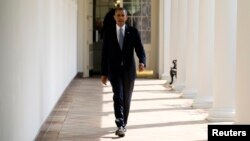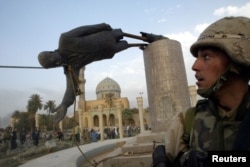“Don’t do stupid stuff.”
President Obama is known for saying that – or a more colorful version of that sentence – in private conversations, according to those close to him. It’s a lesson he drew watching his predecessor, former President George W. Bush, invade Iraq six years earlier. Bush decided to topple Saddam Hussein, deploying tens of thousands of U.S. soldiers into what turned out to be a very difficult and messy conflict.
That war would come to influence much of Obama’s approach to U.S. foreign policy, which has been described variously by critics as “cautious,” “restrained,” “unengaged” and, even, “timid.”
“I think the philosophy that the president brought to governing…was that the United States needed to exercise smart leadership on the world stage,” says former Obama administration official Vikram Singh, now vice president of National Security and International Policy at the Center for American Progress.
Among Obama’s top foreign policy objectives, said Singh, a counter-terrorism expert who served in a number of high level foreign policy positions for the president, was extricating the United States from Iraq, a conflict Obama had termed “the wrong war.”
Syria
But Iraq continues to bedevil the administration today, with the rise of the Sunni extremist group the Islamic State of Iraq and the Levant (ISIL). In June, ISIL, one of the main rebel groups fighting the Assad government in Syria, made stunning territorial grabs across parts of Iraq.
That development forced Obama to rethink his strategy of keeping a safe distance from Syria.
"The [ISIL] stampede into Iraq has, I think, concentrated the minds of the president and policy makers in the administration, and perhaps made them realize that our current policy in Syria isn't working," says Michael Crowley, chief foreign affairs correspondent for TIME.
Last month, Obama asked Congress to authorize $500 million in direct assistance to train and equip what the White House described as "appropriately vetted elements of the moderate Syrian armed opposition.” That’s a notable policy turnaround from the low-level support and CIA training program of small groups of Syrian rebels in Jordan the administration previously authorized.
The shift prompted critics to say Obama missed a window of opportunity in late 2012 when the president decided against a plan presented by then-Secretary of State Hillary Clinton and other senior officials to step up training and arming of the rebels in Syria.
“I am doubtful that currently we will be successful in supporting moderate forces,” says Ariel Cohen, Principal at International Market Analysis, an energy and natural resources advisory company and a scholar at the Heritage Foundation.
“We’ve missed that train at least by two years, maybe more. In the beginning of the conflict this may have been feasible,” Cohen said. “However, today these forces are weak.”
Mideast upheaval
The administration is changing course in Syria – and deeply worried about the situation in Iraq – just as public opinion polls show Americans are increasingly unhappy with the president’s handling of the Iraq war – a conflict Obama technically ended by withdrawing U.S. combat troops in late 2011.
But even Obama critics acknowledge the president has been confronted by an unprecedented level of upheaval in the Middle East, not the least of was the Arab Spring that erupted seemingly without warning in late 2011.
Those popular revolutions, beginning in Tunisia and spreading rapidly to Libya, Egypt, Syria and beyond, helped set the stage for the current turmoil in Iraq and Syria – and Obama’s policy, says Marina Ottaway, a senior scholar at the Wilson Center.
"As long as it was the Arab Spring – that is, something that looked very much like a popular insurrection – the Obama administration, for better or worse, at least verbally, supported it,” Ottoway said. “When it became clearly a war, as it was in the case of Syria, and even more a case of Iraq now, the Obama administration drew the line and said we are not going to go to war again."
The angst over Syria inside the administration became very public in February, when Robert Ford, Obama’s ambassador to Syria resigned, saying he could no longer defend U.S. policy. Ford called it “consistently behind the curve” and said the administration failed in not backing opposition forces in Syria much earlier in the conflict.
“I think he [Obama] had decided that Syria fell below the line of vital American interests,” says Daniel Serwer, professor at the Johns Hopkins School of Advanced International Studies and scholar at the Middle East Institute.
“Anyone, any president would have been enormously challenged by what has gone on in the Middle East in the last several years,” Serwer said, who also believes that Obama waited too long on Syria, but dismisses the notion that the president is disengaged.
And therein lies the very difficult balancing act for any president during current times, said Singh, who adds that much of the job boils down to answering one simple question:
“What are the best of very complicated and bad options for the United States?”
A previous version of this story incorrectly reported that President Obama has asked Congress for $500 billion to aid Syria rebels. VOA regrets the error.




